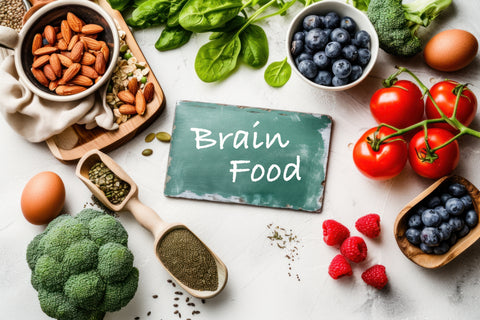You've probably heard some version of this saying—your health is the most important thing you have.
This sentiment is always said regarding our physical health. But what many of us are beginning to realize is that mental health may be even more important than our physical health.
Being in a predictably good mood, free of anxiety, depression, and worry is truly a gift. A great mood allows us to sail through our days, even the tough ones, with positivity and joy.
Having an optimized brain is equally important. Mental clarity, focus, motivation, and being able to solve problems easily doesn't just happen by accident, the same way good physical health doesn’t occur by chance.
When it comes to your physical body, you are what you eat. But the same can be said for your brain and your mood.
If you’re looking for an improved mood and enhanced cognition, we’ve got you covered in this in-depth article. Grab a healthy beverage—Júce anyone? And let’s dig in.
Nutrition and Brain Health
Your brain is a metabolically active organ that requires a constant supply of nutrients to function optimally. A well-balanced diet can provide the necessary vitamins, minerals, antioxidants, and other compounds that support brain health and cognitive function.
Some key nutrients that are particularly important for brain health include:
-
Omega-3 Fatty Acids: There are three main types of omega-3 fatty acids: alpha-linolenic acid (ALA), eicosapentaenoic acid (EPA), and docosahexaenoic acid (DHA). While ALA is found in plant sources like flaxseeds and walnuts, EPA and DHA are primarily derived from marine sources such as fatty fish (e.g., salmon, mackerel, and sardines).
EPA and DHA are essential for brain health for the following reasons:
- Improved neurotransmitter function
- Cognitive development and maintenance
- Neuroprotective effects
- Improved blood flow
-
Antioxidants: Antioxidants play a critical role in supporting brain health by helping to protect the brain from oxidative stress. Oxidative stress occurs when there is an imbalance between the production of reactive oxygen species (ROS) and the body's ability to neutralize them with antioxidants.
Oxidative stress in the brain can damage cell structures, including proteins, lipids, and DNA. This damage can cause various neurological disorders and age-related cognitive decline.
Like Omega 3 fatty acids, antioxidants are chock-full of anti-inflammatory benefits. They also improve blood flow, support mitochondrial function (your cell’s power stations), and promote neuroplasticity — your brain’s ability to adapt.
Sources of antioxidants include fruits, vegetables, nuts, seeds, and certain herbs. Common antioxidants include vitamins C and E, beta-carotene, flavonoids, and polyphenols.
-
B Vitamins: B vitamins help to maintain and promote brain health by supporting various physiological processes within the nervous system such as neurotransmitter synthesis, energy metabolism, DNA and RNA synthesis, and homocysteine regulation which reduces the risk of cognitive decline.
These water-soluble vitamins, including B1 (thiamine), B2 (riboflavin), B3 (niacin), B5 (pantothenic acid), B6 (pyridoxine), B7 (biotin), B9 (folate), and B12 (cobalamin), contribute to the production of neurotransmitters, the synthesis of DNA and RNA, and the metabolism of energy.
B vitamins are often found in a variety of foods, including whole grains, lean meats, dairy products, fruits, and vegetables.
-
Vitamin D: Vitamin D is one of the most important nutrients and also one that we have trouble getting enough of, especially during the winter.
Optimized levels of vitamin D are important to brain health for reasons that include:
- Neurotransmitter synthesis
- Neuroprotective effects
- Brain development and function
- Regulation of calcium and phosphorus
-
Mood regulation
Vitamin D is obtained through exposure to sunlight, certain foods (such as fatty fish and dairy products), and supplements. Research suggests that it's important to maintain appropriate levels of vitamin D through a combination of these sources, as excessive supplementation can lead to toxicity.
-
Iron: Iron is essential for brain health because it plays a critical role in various physiological processes that support the structure and function of the brain such as oxygen transport, energy metabolism, DNA synthesis and repair, and myelin formation.
Myelin is a fatty substance that forms a protective sheath around nerve fibers. Proper myelination is crucial for the efficient transmission of nerve signals in the brain.
Good sources of iron include lean meats, poultry, fish, legumes, nuts, seeds, and iron-fortified cereals.
-
Zinc: Zinc is an essential trace element that plays a vital role in various physiological processes, including those that support brain health.
Zinc is a powerful antioxidant. And it supports learning and memory and has been associated with improved cognitive performance.
Zinc also provides immune system support. (A healthy immune system is important for protecting the brain from infections and inflammation that could impact cognitive function.)
Nutrition and Mental Health
While it may not seem obvious, nutrition plays a crucial role in our mental health.
The food we eat not only affects our physical health but also has a significant impact on our mood and emotions. Several studies have suggested a strong connection between diet and mental health.
Here are some ways in which nutrition can influence mental well-being.
Nutrient Deficiencies and Mental Health
Nutrient deficiencies can have a significant impact on mental health as nutrients play important roles in various physiological processes within the body, including those that affect the brain and nervous system. Here are some ways in which nutrient deficiencies can affect mental health:
-
Hormone Regulation: Some nutrients are involved in the synthesis and regulation of hormones that influence mood and stress response. For example, vitamin D is involved in the production of serotonin, and zinc is a cofactor for enzymes involved in hormone regulation.
-
Immune System Function: Nutrient deficiencies can compromise immune function, making individuals more susceptible to infections. Inflammation and immune system dysregulation have been linked to mental health conditions.
-
Inflammation: Chronic inflammation is associated with various mental health disorders, including depression. Nutrients with anti-inflammatory properties, such as omega-3 fatty acids and antioxidants, play a role in modulating the inflammatory response.
We’ll expand on the role that inflammation plays in mental health in a coming section.
-
Neurotransmitter Imbalance: Many nutrients are essential for the synthesis and regulation of neurotransmitters, which are chemicals that transmit signals between nerve cells. Imbalances in neurotransmitters, such as serotonin, dopamine, and norepinephrine, are linked to mood disorders like depression and anxiety.
We’ll dig deeper into these brain chemicals and how they affect mental health more below.
Common nutrient deficiencies that may impact mental health include:
- Vitamin D
- B Vitamins (especially B12, B6, and Folate)
- Omega-3 Fatty Acids
- Iron
-
Zinc
As you can see, the nutrients we need for our physical brain are often the same nutrients we need for our mental well-being, which makes grocery shopping so much simpler.
Brain Chemicals, Neurotransmitters, and Mental Health
Brain chemicals and neurotransmitters play a critical role in regulating various aspects of mental health, including mood, cognition, and behavior. Imbalances or disruptions in the levels or functioning of these neurotransmitters can contribute to mental health disorders.
Here's an overview of how some key neurotransmitters affect mental health.
-
SEROTONIN
Function: Regulates mood, appetite, and sleep.
Impact on mental health: Low serotonin levels are associated with conditions like depression, anxiety, and mood disorders.
-
DOPAMINE
Function: Involved in reward and pleasure, motivation, and motor control.
Impact on mental health: Imbalances in dopamine are linked to various mental health conditions, including schizophrenia, bipolar disorder, and addiction.
-
NOREPINEPHRINE
Function: Affects attention, alertness, and arousal.
Impact on mental health: Dysregulation of norepinephrine is associated with conditions such as attention-deficit/hyperactivity disorder (ADHD), depression, and anxiety.
-
GABA (Gamma-Aminobutyric Acid)
Function: Inhibitory neurotransmitter that helps regulate anxiety and stress.
Impact on mental health: Low levels of GABA have been linked to anxiety disorders.
-
GLUTAMATE
Function: Excitatory neurotransmitter involved in learning and memory.
Impact on mental health: Excessive glutamate activity is associated with conditions like epilepsy and neurodegenerative disorders. In some cases, imbalances in glutamate are implicated in anxiety and mood disorders.
-
ENDORPHINS
Function: Act as natural painkillers and produce feelings of well-being.
Impact on mental health: Endorphins are associated with the "runner's high" and contribute to a positive mood. Physical activity, laughter, and certain foods can stimulate endorphin release.
-
ACETYLCHOLINE
Function: Involved in learning, memory, and muscle contractions.
Impact on mental health: Imbalances in acetylcholine are associated with conditions like Alzheimer's disease, affecting memory and cognitive function.
-
CORTISOL
Function: Stress hormone released in response to stress.
Impact on mental health: Chronic elevation of cortisol levels due to chronic stress can contribute to anxiety, depression, and disruptions in sleep.
Disruptions in the balance of these neurotransmitters can result from various factors, including genetic predispositions, environmental influences, and lifestyle choices such as poor diet.
Inflammation and Mental Health
Inflammation is a natural and necessary part of the body's immune response to injury, infection, or harmful stimuli. However, chronic or excessive inflammation, particularly in the brain, has been implicated in the development and progression of various mental health disorders.
The complex relationship between inflammation and mental health involves several mechanisms.
-
Neurotransmitter Dysregulation: Inflammatory processes can disrupt the balance of neurotransmitters, such as serotonin, dopamine, and norepinephrine. Imbalances in these neurotransmitters are associated with mood disorders like depression and anxiety.
-
Neuroendocrine Changes: Chronic inflammation can activate the release of stress hormones, including cortisol. Prolonged exposure to elevated cortisol levels can contribute to changes in mood, cognition, and the stress response, potentially leading to mental health issues.
-
Impact on Brain Structure and Function: Inflammation can affect the structure and function of the brain. It may lead to changes in the size and connectivity of brain regions involved in mood regulation and cognitive processes. These changes can contribute to the development of psychiatric disorders.
-
Oxidative Stress: Inflammatory processes can result in increased production of reactive oxygen species (ROS), leading to oxidative stress. Oxidative stress has been linked to various mental health conditions, including depression and schizophrenia.
-
Microglial Activation: Microglia are immune cells in the brain that play a role in immune response and inflammation. Chronic activation of microglia can contribute to neuroinflammation and may be involved in the development of psychiatric disorders.
-
Blood-Brain Barrier Permeability: Inflammation can compromise the integrity of the blood-brain barrier, allowing immune cells and inflammatory molecules to enter the brain. This breach of the blood-brain barrier may contribute to neuroinflammation and impact mental health.
Addressing inflammation through lifestyle changes, such as adopting a healthy diet, engaging in regular physical activity, managing stress, and getting adequate sleep, will have positive effects on your mental health.
Gut-Brain Connection and Mental Health
The gut-brain connection refers to the bidirectional communication between the gastrointestinal (GI) system and the central nervous system, which includes the brain and spinal cord.
This connection consists of a complex network of nerves, hormones, and microbial interactions. Emerging research suggests that gut health can influence mental health and vice versa.
Here are a few ways in which the gut-brain connection affects mental health.
-
Microbiota Composition: The gut is home to a vast community of microorganisms, collectively known as the gut microbiota. These microbes play a crucial role in various physiological processes, including the production of neurotransmitters and the regulation of inflammation. Imbalances in the gut microbiota, known as dysbiosis, have been linked to mental health disorders.
-
Hormonal Regulation: The gut communicates with the brain through the release of hormones and signaling molecules. For example, the vagus nerve, a major nerve that connects the gut and brain, transmits information about the gut environment to the central nervous system.
-
Barrier Function: The gut has a barrier that controls the passage of substances between the GI tract and the bloodstream. Disruptions in this barrier, known as "leaky gut," may allow harmful substances to enter the bloodstream, triggering an immune response that could affect the brain and mental health.
-
Short-Chain Fatty Acids (SCFAs): The gut microbiota produces SCFAs through the fermentation of dietary fibers. SCFAs have been shown to have anti-inflammatory and neuroprotective effects, potentially influencing mental health.
-
Stress Response: The gut-brain axis is involved in the regulation of the stress response. Chronic stress can affect gut function, and conversely, gut disturbances can contribute to stress-related disorders.
Blood Sugar Levels and Mental Health
Blood sugar levels, or glucose levels, can significantly impact mental health and cognitive function. The brain relies on a steady supply of glucose as its primary energy source, and fluctuations in blood sugar levels can influence mood, concentration, and overall mental well-being.
Here are a few ways in which blood sugar levels affect mental health.
-
Energy Supply to the Brain: The brain requires a constant and stable supply of glucose for optimal functioning. Fluctuations in blood sugar levels can affect the brain's ability to maintain consistent energy levels, leading to variations in mood and cognitive performance.
-
Hypoglycemia (Low Blood Sugar): Hypoglycemia occurs when blood sugar levels drop below normal. Symptoms may include irritability, confusion, difficulty concentrating, mood swings, and anxiety. Severe hypoglycemia can lead to cognitive impairment.
-
Hyperglycemia (High Blood Sugar): Prolonged periods of elevated blood sugar levels, common in conditions like diabetes, can contribute to inflammation, oxidative stress, and vascular damage. These factors may negatively impact cognitive function and increase the risk of neurodegenerative disorders.
-
Insulin Resistance: Insulin is a hormone that helps regulate blood sugar levels by facilitating the uptake of glucose into cells. Insulin resistance, a condition where cells become less responsive to insulin, may contribute to cognitive decline and an increased risk of dementia.
-
Effect on Neurotransmitters: Blood sugar levels can influence the production and activity of neurotransmitters, including serotonin and dopamine, which play key roles in mood regulation. Dysregulation of these neurotransmitters is associated with mood disorders such as depression.
-
Hormonal Changes: Fluctuations in blood sugar levels can impact the release of hormones, including cortisol and adrenaline, which are involved in the body's stress response. Chronic stress and dysregulation of stress hormones can contribute to mental health issues.
What’s the best way to maintain stable blood sugar levels?
A proper diet!
As you’ve read in this article, a proper diet is also the best way to support your gut-brain connection, reduce inflammation, and balance your delicate web of brain chemicals. Remember, you are what you eat, and this goes for your mental health as well as your physical.
ABOUT THE AUTHOR
Nick Mistretta is a freelance copywriter, content marketer, and author of the ebook, 25 Superfoods For Super Health. He helps small businesses turn strangers into friends, friends into customers, and customers into loyal customers.
Unstoppable Sports Greens is for unstoppable people. SG7 is an all-in-one greens supplement with 7 essential organic ingredients, proven to fuel performance and accelerate recovery. It also provides the proper brain nutrition you need and it’s certified USDA organic and vegan.
- Greens (energy, detox and cleanse)
- Antioxidants (cellular repair)
- Herbal Adaptogens (mental recovery)
- Mushrooms (immune support)
- Fiber (digestive support)
- Probiotics (gut health)
Reds, Greens, or Hydrate JÚCE Daily Superfood
- Fruit and Vegetable Nutrition (vital nutrients)
- Antioxidants (cellular repair)
- Greens (detox and cleanse)
- Mushrooms (immune support)
- Fiber (digestive support)
- Probiotics (gut health)



